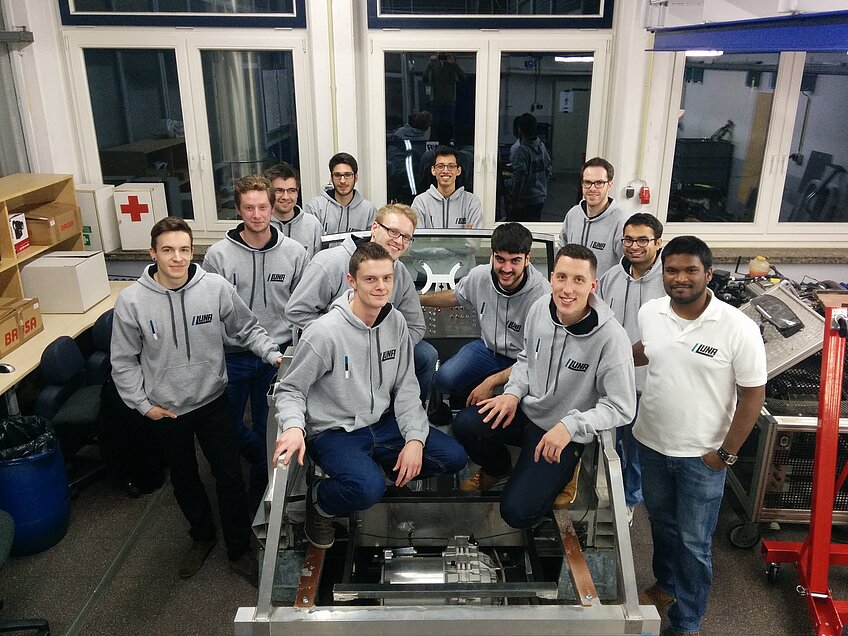
The members of the LUNA project (picture:FH Aachen).
It could be a kind of golf cart, taking the player from fairway to fairway. The location here is very different, though. Amidst tools and heavy equipment, the vehicle is sitting in the work shop on Hohenstauffenallee. Members of the Faculty of Aerospace Engineering's project LUNA are finetuning and working on the prototype which will eventually become a lab vehicle for teaching purposes in the Automotive and Propulsion Technology degree programme. LUNA is developing a hybrid vehicle which is supposed to drive with a petrol- and electromotor first, but which will gradually be retrofitted to other alternative fuels in order to test, for example, consumption and performance.
LUNA stands for "Laborfahrzeug für UNkonventionelle Antriebe" (Lab Vehicle for Unconventional Drives): The name accurately describes the project's aim, which is building a vehicle for lab purposes. The student team around LUNA has existed since 2011, but fell into the proverbial deep slumber in 2012. It wasn't until 2013 that it was resurrected by the new project leaders, Tobias Kauk and Robyn Zielewicz: They diligently read up on the requirements specifications drawn up earlier, in order to record how and to what end the twoseater, a Ford-prototype of the "Scala" model, is to be utilised. The future lab vehicle is a modular type: This means that the built-in elements can be retrofitted quickly and easily. "We can detach the electrical drive unit of the back axle with just ten screws, remove it and insert an alternative drive," Robyn explains. In order to be able to test various drive systems and alternative fuels, this is ideal. "One day, we want to be roadworthy with pure ethanol as fuel," Tobias says. The objective is to have a test vehicle in running order until the end of 2016, which, in bivalent operation, will run on conventional as well as alternative fuels.
At present, students are working on equipping the lab vehicle with a petrol- and electromotor. By now, 18 Bachelor and Master students from the Faculty of Aerospace Engineering as well as Mechanical Engineering and Mechatronics are active within the project. In several groups, members are responsible for one component part, as for example, the internal combustion engine, the transmission, or the axles. Besides the additional specialist expertise that students gain, the independent work and the proximity to their future professional life are especially important to the project leaders. "We negotiate with companies and talk with representatives of industry just as you would in normal everyday work", Tobias says. "Of course you are not under the same pressure as you are in a company, and you are allowed to make mistakes", Robyn adds. But in the end, the project serves as good preparation for a future career - plus, contacts with the industry are established automatically.
Just like any other student project, LUNA thrives on the dedication of its members. True to the motto, "You can, but you don't have to", the project leaders do not want to overtax students. "The course of study definitely takes priority. Everyone should invest as much time as is feasible," Robyn emphasises. But the modular vehicle provides a big enough scope for students from other faculties to realise their own full potential. Thomas describes the work process as follows: "Everyone looks for their own task, something he or she is really interested in. Seeing your own work grow, makes it even more fun."
Back2024 © HAWtech ContactPrivacy PolicyLegal NoteLogin